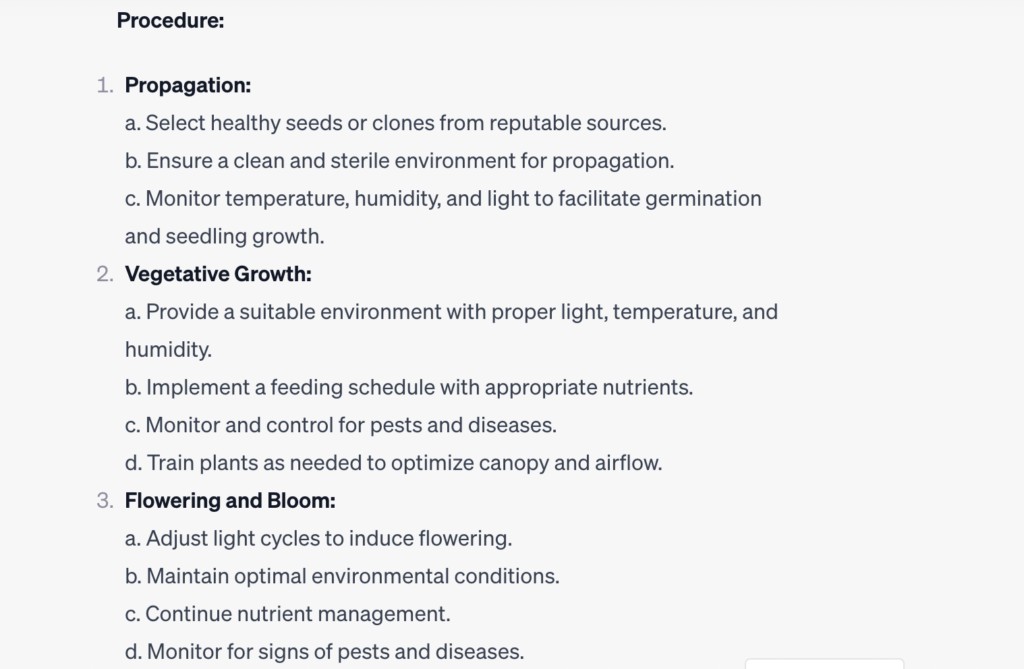As artificial intelligence progresses and ChatGPT becomes mainstream, will there still be demand for technical writing within the cannabis industry? As a writer and consultant specializing in cannabis license applications, this has been the proverbial elephant in my office for the past year. Can you outsource the writing of your license applications and Standard Operating Procedures (SOPS) to the online robots?
I’ve been experimenting with ChatGPT to test the software’s knowledge and to see how I can integrate it into my business. My goal is to provide the highest-quality writing services to my clients and if my team and I can do it for a fraction of the time, I am all for it. Right now, I do not think ChatGPT is going to replace skilled technical writing in cannabis, especially for license applications.
In this article, I’ve outlined my high-level goals when creating cannabis license applications and SOPs and compared these goals to the results I saw when attempting to do the project through ChatGPT. I also share ways that it would be possible to use ChatGPT for certain portions of technical documents to save time and resources.
Chat GPT Experiment
| Diagon Goals & Objectives | Can ChatGPT Do it? |
| Writing a License Application Goal: Every line from all relevant codes will be referenced and incorporated in the application in the appropriate section |
No. ChatGPT does not have the capacity to access the relevant cannabis laws/ regulations and plug them into the writing. Cannabis laws and regulations are always in flux, and of course, it’s critical to use the most up-to-date versions. ChatGPT was trained using data available up to 2021. As of September, ChatGPT gained the functionality to access real time information from the internet. This is an improvement in the software’s functionality but increases the risk it will pull false or unreliable information. |
| Writing a License Application Goal: Emphasize and highlight the team’s experience and competitive advantage. |
No. Unless you’re Snoop Dogg. ChatGPT doesn’t have access to specific information about individuals who are not public figures or widely known. But they have a great write-up on Snoop Dogg! |
| Writing a License Application Goal: Use historical successful license applications from that state or a comparable market as a guide to ensure that we cover every possible angle/detail that the relevant department is considering. |
No. Typically, states do not make successful license applications available on the internet. You must make a request for information from the department, either online or via phone. In Texas, for example, they sent me a CD Rom with the historical applications from 2017. |
| Writing a cannabis cultivation SOP goal: Create customized, detailed standardized operating procedures, referencing every phase of plant growth. |
Yes but mostly no. ChatGPT does have some knowledge about the phases and the elements of cannabis cultivation. (See sample below.) However, the plan it produced is very basic and outlines the stages and phases of growth without giving any specific details on how it is done. All facilities and growers have their own unique style and equipment so it’s critical to incorporate all of this into an SOP. |
Chat GPT Sample Cultivation SOP

When it comes to a competitive license application to obtain a license to cultivate, manufacture, or dispense cannabis, plugging the questions into ChatGPT would guarantee a failure. These applications are scored for their level of detail and must be highly personalized for the specific market. However, I do think there are ways to harness this technology and use it for copywriting, marketing, and certain elements of training plans and SOPS. For example, if you are creating a disaster emergency plan for your dispensary, you could use ChatGPT to establish a rough outline. You could use this as a base and then add in detail specialized knowledge about your business. I also think ChatGPT can be used for blog articles if you are able to guide the software with an interesting enough question. But as more and more people do this, the content will start to be repetitive and dull and readers will probably lose interest.
I am curious and interested in how artificial intelligence will affect and shape the cannabis industry. I recently visited a cannabis cultivation facility and was extremely impressed by the features of the security cameras. The security system uses artificial intelligence to detect changes in temperate and barometric pressure to signal warnings for inclement weather. But for right now, I highly recommend employing a specialized writer and industry consultant to create license applications, SOPS, and other technical documents for your business. ChatGPT was trained on 300 billion words, while the average native English speaker has access to just 20,000–35,000. But sometimes where technology gets ahead of itself is quantity over quality. Access to billions of words is not as relevant as being able to spin these words in a way that will make your business competitive in the long-run.

Recent Comments